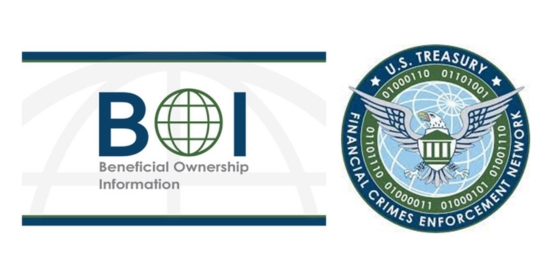UPDATED 3/3/205 – BOI Reporting Reinstated: Latest Legal Developments
Feb 20, 2025

UPDATE 3/3/2025: FinCEN Not Issuing Fines or Penalties in Connection with Beneficial Ownership Information Reporting Deadlines, read FINCEN’s release here!
On Monday, February 17, a federal district court judge in Texas lifted the suspension on the Corporate Transparency Act, reinstating the requirement to report beneficial ownership information.
In a recent announcement from the Financial Crimes Enforcement Network (FinCEN), the deadline for most companies to submit their reports has been extended to 30 calendar days from February 19, 2025, setting the new due date to March 21, 2025.
FinCEN also mentioned plans to review the beneficial ownership information reporting requirements under the Corporate Transparency Act. This review aims to reduce the reporting burden on low-risk entities while focusing enforcement efforts on threats that pose significant risks to U.S. national security. The criteria for identifying low-risk companies remain unclear, but this evaluation will occur over the next 30 days.
For general details on BOI Reporting being reinstated, please visit William Vaughan Company’s BOI Insights & Resource Hub. For comprehensive guidance, we encourage you to visit FINCEN’s website.
Categories: Tax Compliance
President Biden Signs Into Law the Social Security Fairness Act
Jan 06, 2025
Law to boost social security payments for millions of public workers

On Sunday, President Biden signed the Social Security Fairness Act into law, significantly increasing Social Security benefits for nearly 3 million former public employees in the United States. This landmark legislation repeals two significant federal policies—the Windfall Elimination Provision (WEP) and the Government Pension Offset (GPO).
These policies previously prevented teachers, firefighters, police officers, and other government workers with pensions from jobs that didn’t contribute to Social Security from receiving full Social Security benefits. They also reduced benefits for those workers’ spouses and surviving family members. The repeal marks a meaningful step toward greater financial security for these individuals and their families.
What does this mean for you?
If you worked in a public sector position, you might qualify for higher Social Security benefits based on your work and pension history. Additionally, if you’re a spouse or survivor, your benefits could increase.
The enhanced benefits introduced by the Social Security Fairness Act would apply retroactively to December 2023. This means that payments for eligible individuals are expected to be backdated to January 2024.
Next steps?
The Social Security Administration is expected to release additional details about the implementation soon. We encourage you to stay informed by visiting their official page: https://www.ssa.gov/benefits/retirement/social-security-fairness-act.html
Connect With Us.
Categories: Other Resources
UPDATED 12/27/24 – BOI Reporting Requirements Reinstated – Earliest Filing Deadline Now January 13, 2025
Dec 27, 2024

UPDATE 12/27/2024: BOI Whiplash? Fifth Circuit Reverses Course, Blocks BOI Reporting in reversal decision, read the full NFIB article here!
On December 23, 2024, a federal court of appeals lifted the injunction on the Corporate Transparency Act (CTA). Effective immediately, the Act’s BOI reporting requirements are reinstated.
In response to the court’s ruling, FinCEN has recognized the need for additional time to comply, therefore granting a 12-day extension so that most BOI filings are now due by January 13, 2025.
FINCEN issued the following alert:
In light of a December 23, 2024, federal Court of Appeals decision, reporting companies, except as indicated below, are once again required to file beneficial ownership information with FinCEN. However, because the Department of the Treasury recognizes that reporting companies may need additional time to comply given the period when the preliminary injunction had been in effect, we have extended the reporting deadline as follows:
- Reporting companies that were created or registered prior to January 1, 2024 have until January 13, 2025 to file their initial beneficial ownership information reports with FinCEN. (These companies would otherwise have been required to report by January 1, 2025.)
- Reporting companies created or registered in the United States on or after September 4, 2024 that had a filing deadline between December 3, 2024 and December 23, 2024 have until January 13, 2025 to file their initial beneficial ownership information reports with FinCEN.
- Reporting companies created or registered in the United States on or after December 3, 2024 and on or before December 23, 2024 have an additional 21 days from their original filing deadline to file their initial beneficial ownership information reports with FinCEN.
- Reporting companies that qualify for disaster relief may have extended deadlines that fall beyond January 13, 2025. These companies should abide by whichever deadline falls later.
- Reporting companies that are created or registered in the United States on or after January 1, 2025 have 30 days to file their initial beneficial ownership information reports with FinCEN after receiving actual or public notice that their creation or registration is effective.
- As indicated in the alert titled “Notice Regarding National Small Business United v. Yellen, No. 5:22-cv-01448 (N.D. Ala.)”, Plaintiffs in National Small Business United v. Yellen, No. 5:22-cv-01448 (N.D. Ala.)—namely, Isaac Winkles, reporting companies for which Isaac Winkles is the beneficial owner or applicant, the National Small Business Association, and members of the National Small Business Association (as of March 1, 2024)—are not currently required to report their beneficial ownership information to FinCEN at this time.
For general information regarding the CTA and BOI reporting requirements being reinstated, please refer to William Vaughan Company’s BOI Insights & Resource Hub.
Categories: Tax Compliance
What the Recent Injunction Against the Corporate Transparency Act (CTA) Means for Your Business
Dec 05, 2024

On Tuesday, a federal court in Texas issued a nationwide injunction prohibiting the enforcement of the Corporate Transparency Act (CTA). The CTA, which was set to require an estimated 32.5 million companies in the U.S. to report sensitive information about their beneficial owners (BOI) to FinCEN by January 1, 2025, is now on hold due to constitutional concerns.
What Does This Mean for You?
The court’s decision means that companies are no longer obligated to meet the January 1, 2025, BOI reporting deadline or comply with related CTA requirements. While this provides immediate relief, the ruling is not necessarily final. The federal government is expected to appeal, and higher courts, including the Supreme Court, may weigh in.
For now, the CTA’s enforcement is paused. However, the broader legal battle is likely to continue, and the final outcome remains uncertain.
Our Recommendation
We advise clients to remain proactive:
- Continue Gathering Information: If your business falls under the CTA’s reporting requirements, we recommend you gather the necessary BOI information. Preparing now will help ensure compliance should the injunction be lifted or the requirements reinstated. Check out our BOI Insights & Resource Hub for details.
- Stay Informed: Legal and regulatory landscapes can shift quickly. We will continue to monitor developments closely and provide updates as the situation evolves.
- Be Ready to File: While enforcement is currently halted, the best course of action is to be prepared to submit your BOI report promptly if needed.
The implications of the Corporate Transparency Act injunction go beyond compliance and touch on broader concerns about federal authority and privacy. Rest assured, we are here to guide you through these changes and keep you informed. If you have questions or need assistance navigating these requirements, please get in touch with a member of our BOI reporting team at wvco.com/contact-us.
Categories: Tax Compliance
Understanding the Visa and Mastercard Settlement
May 21, 2024
What You Need to Know About the $5.54 Billion Credit Card Settlement
Recently, credit card giants Visa and Mastercard reached a $5.54 billion settlement with merchants overinflated credit card interchange fees, commonly known as “swipe fees.” This decades-long legal battle has resulted in the largest antitrust class-action settlement in U.S. history.
What Does This Mean for Merchants and Consumers?
While the Visa and Mastercard settlement still awaits approval by a federal court, its approval could benefit not only merchants but consumers as well.
Key Points of the Settlement:
- Visa and Mastercard have agreed to lower published credit-card interchange fees by four basis points in the U.S. for at least three years.
- Neither company will raise interchange fees for five years above the rates that were in place at the end of 2023.
According to a statement from one of the law firms involved in the settlement, “the interchange fee reduction could save merchants $29.79 billion in the five years after the settlement is approved.”
Eligibility for Claim Submission
If your business accepted Visa and/or Mastercard between January 1, 2004, and January 25, 2019, you may be eligible for a share of a $5.54 billion payment card settlement. This includes businesses that have since closed or gone bankrupt.
How to Submit a Claim
In an Order dated May 14, 2024, the Court granted an extension of the claims-filing deadline. The new deadline to submit claims is now August 30, 2024.
The official court-authorized settlement website can be found here.
There are two methods by which you can submit a claim:
- If you received a Claim Form in the mail and want to file a claim online using the Claimant ID provided, you will select that option on the settlement website.
- If you did not receive a claim form in the mail, you can begin the claim filing process by clicking the button for Taxpayer Identification Number (TIN). Once you create your account using your TIN, you will need to provide supporting proof of authorization documentation in order to access your interchange transaction fees. Proof of authorization could be a certificate of incorporation, a certificate of dissolution, a W-9, or a utility bill.
For step-by-step instructions on submitting a claim by either method, review the following video provided by the court-authorized website: https://www.youtube.com/watch?v=TuHOnvlVFpI
Potential Settlement Payout
The amount you receive from the settlement fund will be based on your actual or estimated interchange fees attributable to Visa and Mastercard transactions between January 1, 2004, and January 25, 2019.
Factors Influencing Payout Amount:
- The total dollar value of all valid claims filed.
- The cost of class administration and notice.
- Applicable taxes on the settlement fund.
- Attorney fees and expenses.
Money awards to the Rule 23(b)(3) Class Plaintiffs for their representation of merchants in MDL 1720, culminating in the Class Settlement Agreement, all approved by the Court.
Conclusion
The Visa and Mastercard settlement represents a significant resolution to a long-standing issue affecting merchants and consumers. By understanding the details and eligibility criteria, businesses may use this settlement to recoup some costs incurred from inflated swipe fees. For more information and to submit your claim, visit the official settlement website: https://www.paymentcardsettlement.com/en
Categories: Other Resources
